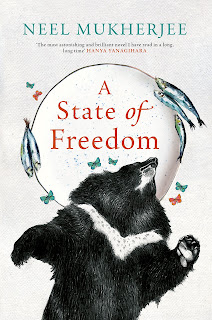I bumped into this novel called “A State of Freedom” by Neel Mukherjee when I was looking for offbeat novels to read. Since many readers recommended it on the internet and the author seemed to have a good track-record of awards for his past novels, I thought of grabbing a copy and getting a first hand experience. Here is what I think about this novel.
A State of Freedom does live up to it’s reputation of being off-beat. It is a conglomeration of 5 different short stories, but when you complete reading all five you realise that there is a subtle relation that connects them. A character which is not explored to depth in the second story is given a full story in form of story no. 4- which explains this characters odd behaviour in the previous story. Story no. 5 seems to be ending abruptly on a cliffhanger, but if you think hard, it’s end is explained in story 1 in a subtle way, that if you are not witty enough, you may miss it. Many scenes in story no. 1 that seem to be just unexplained pieces of information get a meaning as the other stories unfold. So, kudos to the writer, for his intelligent writing and making the readers really think and apply their brains to understand the beauty of the story.
So the seemingly different stories are of 5 characters that belong to the underprivileged section of the Indian society. The poor, destitute, daily wage workers, domestic maids referred to as “servant class” by the rich and super rich and their struggles to get a better life. It shows that 2 contradicting sides of Indian society - the well-to-do rich and the extremely poor and how the wide gap leads to discriminations and atrocities, sometimes deliberately and at other times something as normal undocumented rules.
The book starts with a story which is about a non-resident Indian father who comes back to India with his 6-year-old son after a long time, and is concerned that the dark pains of the society here would have a negative impact on his son. Next, we have the story of a non-resident Indian author (staying in London) who spends a month or two with his parents in Mumbai once in a year, and ends up being friendly with their cook and accepts an invitation to her home in Kolkata. This is followed by a grim story about a man struggling to make the ends meet, finds a bear cub and sees it as an opportunity to make money by making it dance on the streets. Then, we are introduced to two little girls who are childhood friends from poor families, both wanting a better life. In their attempts, they end up with totally different fate- one ending up as a Naxalite and other as a house-maid staying in the slums of Mumbai. Finally, the last story is about a construction labourer who is ailing from a chronic disease, still works to earn Rs. 75 a day and his memories of his dark past. How these stories are related is something you have to read and discover.
This is not one of those novels that will make you feel good at the end of the final chapter. It is dark, gloomy and makes you ponder on the lives of the weaker section, if we can call it that. If you have a weak heart or can’t stand animal cruelty, you should keep away from this book. The novel touches many dark aspects like pay parity, discrimination of servants, animal cruelty and sacrifices, superstitions, poverty, slums, maoists, politics, violence, rape… almost all the ills of the society.
As a reader, it also had me thinking- why are all award-winning or seemingly “good” novels are the ones that portray the dark side of the Indian society? Shantaram, The White Tiger, Q&A (which was adapted into the Oscar-winning Hollywood movie Slumdog Millionaire), A Free Stage (by V. S. Naipaul)- all have one common theme that you also see in this book. Recently, a Hindi-translated novel won the Booker Prize- “A Tomb of Sand”. I wonder if this is also based on the same theme? Is it something that west is accustomed to appreciate about India or have Indians become the Ostrich that bury their heads in the debris of the mud and going ga-ga about the greatness of the country? Well, this is the kind of impact the book will have on you- it makes you think- deeper, and deeper.
So, if you are looking for a different kind of a read, and have a strong heart, go for it. If you like to read something motivational, inspirational, feel-good content, then keep away!
I would give it 3.5 stars out of 5, because though the writing is clever, theme is deep, the story can be treated as ordinary and used more as a means of conveying the hard-hitting realities. As a reader I thought there were many plot angles which could have been explored that could enhance the story-telling ability of the novel. For eg. one character remembers about his gore experience of animal sacrifice in the temple- but the reader fails to understand why 3-4 pages were invested into just describing this, and doesn’t add any value to the story of the character and his present ongoing events. The first story has rather a shocking end, but not at all logical and keeps the reader guessing what (or why?) the author was actually trying to convey.

No comments:
Post a Comment